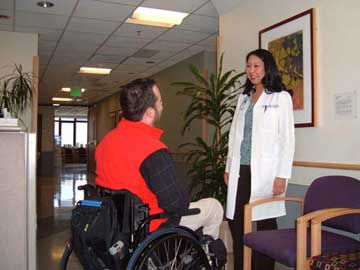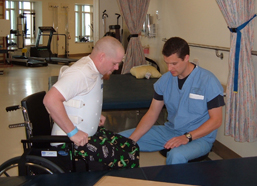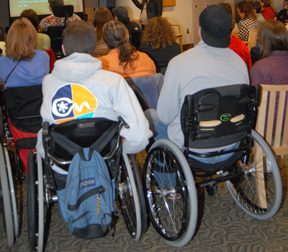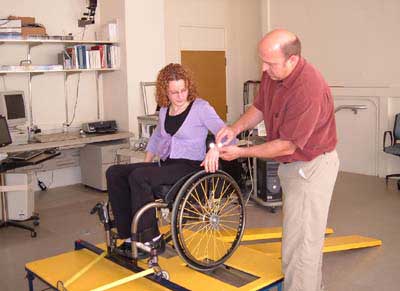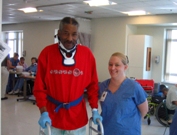SCI Forum Report
Personal Care Attendants
November 12, 2002
Resources on this topic are listed at the end of this report
(Names have been changed to protect privacy.)
For many people with SCI, personal care attendants are a necessary and sometimes complicated part of everyday life. This evening's forum featured a panel of four people with longtime SCI who talked about their methods of hiring and managing attendants.
Karl was injured at the C6 level in 1983. He is self-employed, works at home and lives alone. "I use a manual chair all the time and drive independently," he said. "I have assistance in the home for 4 1/2 hours every morning. I hire people directly and pay them with my own personal funding. People who work for me also do cooking, cleaning, personal care assistance and range of motion and weight training."
Allen was injured in 1992 and has a C4-5 incomplete injury. Like Karl, he lives alone in his own home and hires his own attendant care. He uses a motorized wheelchair and drives a van.
"I was injured in 1992; I'm a C6-7," said Will "I've used private companies for the entire time. I only need care for about an hour and a half every morning." Will works full-time and lives with his wife and son.
Jean, who has C6-7 incomplete tetraplegia, uses an electric wheelchair and has attendants provided through an agency. "I don't have to pay them directly because of the programs I'm on, but I do interview them and have the final say on who gets hired."
When Karl was first discharged from the hospital in 1984 he used agencies for a couple of years but became frustrated with the high turnover and the erratic quality of staff. He started hiring people himself and found he could manage them more effectively that way. "I wasn't a manager of employees when I was injured. It's a whole different realm, to learn how to manage people in this type of relationship."
First, he had to learn how to run a business. "I do everything completely by the rules," he said. "In the State of Washington, you're required to get a business license. I have an employer number and do all the federal and state taxes, employment taxes, and withholding of Medicare and Social Security. Federal income tax withholding is not required. People sometimes have asked me to pay them under the table, but I just don't do it. I'm not saying it's right or wrong-it's each person's choice."
As an employer, he assumes liability for any injuries his employees might incur while working for him. He found that adding an endorsement to his homeowner's policy was the simplest way to do this, and quite affordable. "I encourage you to get some kind of liability coverage if you are hiring people to work for you in your home," he said..
Karl recommends developing a written plan of care based on a careful analysis of the personal care duties you require. "That'll help you define the type of person you want to hire," he said. "I also try to find someone who's got a personal and work ethic that's similar to my own."
Will was initially concerned that having people come into his home might feel intrusive. "But really it's worked out quite well. They basically come through the door and come upstairs and begin on our morning routine. It's much more comfortable than I thought it would be."
Karl is very thorough in his hiring process. He developed his own four-page application form that includes questions about education, work history, references, temperament, goals and work habits. He keeps a telephone log to jot down information about all the people who call in response to his ads. Karl recommends the manual, Managing Personal Assistants: A Consumer Guide, published by the PVA, which is full of helpful information and sample forms. It can be downloaded in whole or part off the Internet at http://www.pva.org/site/DocServer/PersAsst.pdf?docID=687.
Karl often hires and trains people who have never done this type of work before. "The two people who work for me now never had experience doing intimate personal care, like bowel programs, before me. Both learned how to do all my care after a three-day training period." Karl schedules overlap so the departing attendant can train his or her replacement. "I want them to have hands-on training well before the current person leaves, because I need to know right away-do they really want to do this kind of work? If not, I need to quickly go on to the next candidate."
Jean, who occasionally hires her own help, recommends checking the ad when it comes out in the paper, "to make sure it's correct and in the right location in the classified section." One time her ad mistakenly appeared in the cleaning section-this caused confusion when Jean started describing her bowel program to the callers.
Karl's typical newspaper ad is brief: Aid for male, Sat & Sun, 4 1/2 hours, mornings, phone number. "That's about all you can get on two lines. It runs seven days for $28."
Advertising in the neighborhood paper often attracts applicants who live nearby, an advantage in emergencies and when bad weather or traffic might otherwise cause delays.
For Karl, the telephone interview is crucial. He has learned how to get key information during a telephone call about personality, attitude, long range employment plans, as well as a sense of overall compatibility. The last time he hired someone he filled the position the day the ad came out. " I didn't need to do another interview. I was that confident on the phone that it would work."
Even after he hires someone, he continues to take calls as long as the ad runs. "I want to keep a resource log of who might be out there. I absolutely look for somebody who lives within 5-15 minutes from me."
Hiring is time-consuming and costly, and all the panelists agreed that they try to get some kind of long-term commitment when they hire someone. "You don't have any enforcement," Karl said. "But you can have a reward structure that helps. And you can create a positive working environment so a person actually enjoys coming to work." Karl gives a $200 bonus to attendants who work for him for a year. Since it costs him about $400 to hire and train a new employee, the bonus makes economic sense. "The ad's cheap," he added. "You might as well invest in three or four ads rather than train the wrong person."
Jean acknowledged that the attendant position "is kind of a dead end job. There's no room for advancement. I give bonuses and gifts all the time. But if they want to go, they'll go. There's nothing you can do about it."
Will has been satisfied with most of his attendants, which have all come from agencies. "There's probably only three or four people I really wouldn't want to see again. I have the benefit of screening them. But things have gone pretty well in that regard. Both males and females have worked out."
A quick polling of the room revealed a wide variation in attendants turnover, from two weeks to 14 years.
Karl pays his attendants $12-13 an hour. "With my taxes, it might cost me around $14 an hour." Jean pays $10 an hour, "under the table."
Preparing for emergencies-when an attendant is sick or a snow storm makes roads impassible-is just another part of attendant management. An advantage of using agencies is that they are responsible for providing an attendant in an emergency. Karl starts calling people who've worked for him in the past. During a major snow storm one year, only his sister was able to get to his house. It worked out in this case, but the panelists and audience members agreed that relatives don't usually engender a good employee-employer relationship.
Personal safety is another significant issue for people using in-home attendants, especially if they live alone. Jean described a harrowing experience with an agency: "I got a call on my cell phone while I was away from home, and the agency told me, 'there's somebody coming to your house. Don't let them in the door.'" They hadn't completed the criminal background check before dispatching the attendant to her home. When the report came back, it was extremely negative. "I was furious!" she said. "The message here is: Watch your back!"
"I do all my own reference checks," Karl said. "I get their employment history and check out their references. I listen to how they present themselves, how credible they are."
It's easy to be fooled by the way people present themselves, he added. "It's now affordable and quick to do a criminal background check online through the Washington State Patrol. They report any felony convictions a person has in the State of Washington. It's public information and includes all pending felony arrests in the last year. Records go back to 1972. It's ten bucks and effectively instantaneous." For information, contact the Washington State Patrol's WATCH (Washington Access To Criminal History) Program (360-705-5100; https://watch.wsp.wa.gov ).
Jean has had her car insurance agent obtain information about driving and criminal history. "Doing a driving check tells you a lot about a person, too."
All agreed that it's important to prepare yourself for the inevitable time when you will need to terminate an employee who doesn't work out. Allen suggested having a friend or family member with you in case the employee becomes angry.
"I encourage using humor when problems arise," Karl said. "Personal problems are difficult, so the faster they're addressed, the better. I always encourage feedback and comment, suggestions for change."
In closing, Karl shared a tip he learned from a yoga master. "He taught me how to visualize the type of person I want (for an attendant) in detail. I'd picture that person responding to my ad, that person working for me." The more specific the image, the better. "Cut something out of a magazine, find an image. The more you define and visualize this happening, the more likely it will happen. Even as they are working for you, go over in your mind what a great job they're doing. It works for me. At a minimum it can definitely help you define the kind of person you want working for you and the tasks you want them to do."
Resources
-
Publications
- Caregivers and Personal Assistants:
How to Find, Hire and Manage the People Who Help You (Or Your Loved One!) by Alfred H. DeGraff. (Saratoga Access Publications, Inc.; 2002; 512 pages; paper: $25)
- Managing Personal Assistants: a consumer guide
(Paralyzed Veterans Administration; 2000; 70 pages; 800-424-8200; http://www.pva.org )
Download guide for free: http://www.pva.org/NEWPVASITE/publications/pdf/PersAsst.pdf
- Personal Care Assistants, SCI Information Sheet #6
(free; UAB-Spain Rehabilitation Center; 205-934-3283; email: rtc@uab.org )
Download for free: http://www.spinalcord.uab.edu/show.asp?durki=22411
Services
- Washington State Patrol's WATCH (Washington Access To Criminal History) Program (360-705-5100; https://watch.wsp.wa.gov )
- Caregivers and Personal Assistants:

